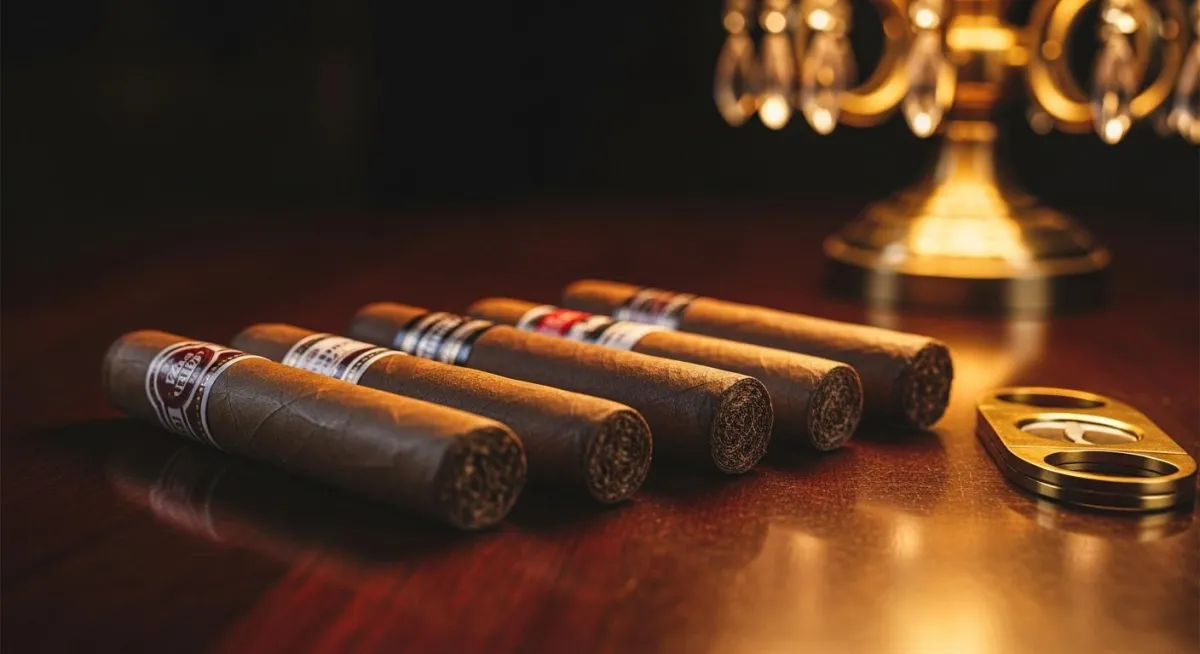
Navigating the World of Premium Cigars: A Novice's Essential Guide
Hey there, fellow flavor adventurer! I'm your guide, your seasoned companion, on this incredible journey into the world of premium cigars. For years, I've savored the subtle nuances, the rich aromas, and the pure relaxation that a well-crafted cigar offers. It’s more than just a smoke; it’s a ritual, a moment of reflection, and a celebration of craftsmanship. And trust me, getting started can feel a bit overwhelming with all the choices out there – from countless cigar brands to finding the right cigar for sale. But don't worry, I'm here to demystify it all and help you discover your perfect puff.
This isn't about being an expert overnight; it's about building your understanding, one satisfying smoke at a time. Consider this your personal roadmap to becoming a confident cigar enthusiast.

Understanding the Allure of Premium Cigars
So, what makes a cigar "premium"? It's a combination of factors:
Quality Tobacco: Sourced from specific regions with ideal climates, like Cuba, Nicaragua, and the Dominican Republic, these tobaccos are meticulously cultivated and aged.
Expert Craftsmanship: Premium cigars are almost always handmade by skilled rollers, ensuring a perfect draw and even burn.
Complex Flavors: Unlike mass-produced cigars or cigarettes, premium cigars offer a symphony of flavors – earthy, nutty, spicy, sweet, woody, creamy, and more.
It’s this dedication to quality and tradition that elevates the experience. You're not just smoking; you're appreciating a work of art.
Your First Steps: Choosing the Right Cigar
Let's talk about finding your first cigar. The key is to start mild and gradually explore. Think of it like tasting wine – you wouldn't start with a heavily tannic red if you're new to it!
1. Strength Matters: Mild is Your Friend
For beginners, a mild-bodied cigar is the way to go. These cigars are smoother, less overwhelming, and allow your palate to gently adjust to the flavors. Don't mistake "mild" for "lacking flavor" – many mild cigars offer incredibly rich and enjoyable profiles.
2. Size and Shape: Start Modest
You'll encounter various shapes (vitolas) and sizes. For your first few smokes, consider:
Corona: A classic, straightforward shape, usually around 5.5 inches with a 42-ring gauge (diameter).
Robusto: A popular choice, typically around 5 inches with a 50-ring gauge. It offers a good amount of smoke in a manageable timeframe.
Petit Corona / Half Corona: Shorter smokes, perfect for a quick introduction without a long commitment.
Avoid the really large, full-bodied cigars like Churchills or Double Coronas for now. You want to enjoy the experience, not feel overwhelmed!
3. Wrapper Wisdom: A Glimpse into Flavor
The wrapper leaf is a huge contributor to a cigar's flavor and appearance. Here are a few common types and what to expect:
Connecticut: Often light brown, creamy, and mild. Excellent for beginners.
Habano: Typically medium to dark brown, offering more spice and earthiness.
Maduro: Dark brown to almost black, known for rich, sweet notes of chocolate, coffee, and sometimes fruit. While delicious, some Maduros can be fuller-bodied, so choose a mild-to-medium Maduro if you're trying one early on.
My Personal Recommendation for Beginners: Look for a cigar with a Connecticut wrapper from a reputable brand. They're consistently smooth and enjoyable.

Top Cigar Brands for Beginners
Based on my experience and countless conversations with new smokers, here are some cigar brands that consistently deliver a great first impression:
Ashton Classic: This is often my top recommendation. Extremely smooth, creamy, and consistent. A true benchmark for mild cigars.
Macanudo Cafe: Another excellent choice for its mildness and easy-going flavor profile. Very approachable.
Montecristo (specifically the "White Series" or "Classic"): While Montecristo has fuller options, their milder lines are fantastic. They offer a classic Cuban-esque flavor profile without the intensity.
H. Upmann (try the "Half Corona"): A great short smoke with nutty and slightly sweet notes.
Romeo y Julieta (look for "1875" or "Reserva Real"): These offer a pleasant, balanced experience with a touch of sweetness and mild spice.
Oliva Connecticut Reserve: A wonderfully smooth and flavorful Connecticut blend from a highly respected brand.
When you're looking for cigars for sale, keep these names in mind. Many tobacconists and online retailers will have these readily available.
Where to Find Your Next Premium Cigar: Online vs. Local
Once you've decided on a few cigar brands to try, where do you buy them?

1. Local Tobacconist:
Pros: Hands-on experience, expert advice, ability to inspect cigars, and immediate gratification. Building a relationship with a local tobacconist is invaluable for learning.
Cons: Limited selection compared to online, potentially higher prices.
2. Online Cigar Retailers:
Pros: Vast selection of premium cigars, competitive pricing, ability to read reviews, and often great deals on cigar samplers (which are perfect for beginners!).
Cons: Can't physically inspect the cigar before purchase, shipping times, and you need to ensure the retailer is reputable and handles storage correctly.
Essential Cigar Accessories for a Smooth Experience
You’ve got your cigar; now you need the right tools!
Cigar Cutter: This is non-negotiable. A clean cut is crucial for a good draw.
Guillotine (Straight Cutter): The most common and versatile. Opt for a double-bladed one for a cleaner cut.
Punch Cutter: Creates a small circular hole, great for a more concentrated draw.
V-Cutter: Creates a "V" shaped notch, offering a unique draw.
My Recommendation: Start with a good quality double-bladed guillotine.
Cigar Lighter: Forget regular lighters or matches – they can impart unwanted flavors.
Butane Torch Lighter: Provides a clean, odorless flame perfect for toasting and lighting your cigar evenly.
Wooden Cigar Matches: If you prefer a more traditional ritual, ensure they are long, sulfur-free matches.
Ashtray: A proper cigar ashtray with wide rests is essential for a clean and safe smoking experience.
Humidor (for longer-term storage): If you plan on buying more than a few cigars or storing them for longer than a week, a humidor is vital. It maintains the ideal humidity (around 65-72%) to keep your cigars fresh. For beginners, a small travel humidor or even a Ziploc bag with a Boveda humidity pack can work wonders for short-term storage.
The Art of Smoking a Premium Cigar: It's a Slow Dance
This is where the true enjoyment begins.

Cut the Cap: Hold the cigar firmly and make a quick, clean cut just above the "cap" (the rounded end you put in your mouth). You want to create an opening that allows for a good draw without unraveling the wrapper.
Toast the Foot: Gently hold the foot (the end you light) of the cigar above the flame, slowly rotating it until it's evenly charred. You're not lighting it yet, just preparing the tobacco.
Light Your Cigar: Now, bring the flame directly to the toasted foot while gently puffing and rotating the cigar. You want to achieve an even glow across the entire foot. Take your time!
The First Puff (and beyond):
Don't Inhale! This is crucial. Cigar smoke is meant to be savored on the palate, not inhaled into the lungs.
Take Small Puffs: Gentle, slow puffs every 30-60 seconds are ideal. Rushing will make the cigar burn hot and taste bitter.
Ash is Your Friend: Don't tap off the ash like a cigarette. A longer ash helps keep the cigar burning cooler. Let it fall naturally or gently tap it off when it's about an inch long.
Enjoy the Journey: A premium cigar is an experience that unfolds. Flavors will evolve as you smoke. Pay attention to them! And most importantly, relax and enjoy the moment.
Frequently Asked Questions about Premium Cigars
Q1: How long does a premium cigar last?
A: It varies greatly by size. A Petit Corona might be 30-45 minutes, a Robusto 45-75 minutes, and larger cigars can last 1.5 to 2+ hours. Factor in your available time when choosing a cigar for sale.
Q2: Can I relight a cigar?
A: Yes, absolutely! If your cigar goes out, simply tap off any loose ash, re-toast the foot, and relight it as you did initially. Try to relight within a few hours for the best flavor.
Q3: What drinks pair well with cigars?
A: Many options! Coffee, dark rum, whiskey (bourbon or Scotch), port wine, and even some craft beers can complement cigar flavors beautifully. For beginners, try a mild cigar with coffee or a light rum.
Q4: Is cigar smoking addictive?
A: Yes, cigars contain nicotine, which is addictive. While cigar smoke is not typically inhaled, nicotine can be absorbed through the lining of the mouth. Be mindful of your consumption.
Q5: How do I store cigars without a humidor?
A: For a short period (a few days to a week), you can use a Ziploc bag with a Boveda humidity pack. For longer storage, a humidor is essential to prevent them from drying out and losing flavor.
My Parting Wisdom: Embrace the Exploration
The world of premium cigars is vast and incredibly rewarding. Don't be afraid to experiment. Try different cigar brands, explore various sizes and wrappers, and pay attention to how your palate develops. Each cigar tells a story, and with every puff, you'll uncover new depths of flavor and aroma.
Remember, it's not about being pretentious; it's about appreciation. The joy comes from the journey, the discovery, and the shared camaraderie among those who appreciate the finer things in life. So, go forth, choose your premium cigar, and embark on your own delightful smoking adventure! I'm confident you'll find it incredibly fulfilling.

All rights reserved. © 2023 Cigar Bandz. No part of this website may be reproduced, distributed, or transmitted in any form or by any means without the prior written permission of Cigar Bandz. Unauthorized use is strictly prohibited.
+1 321-321-2720
